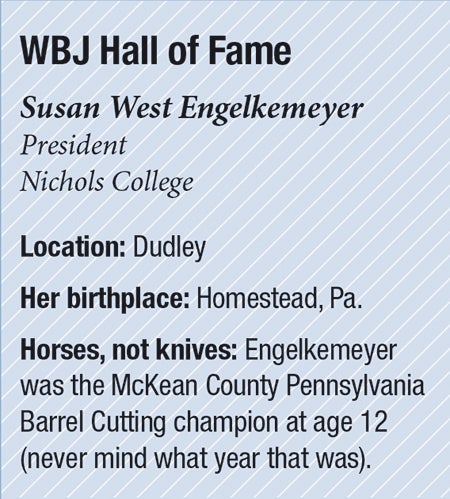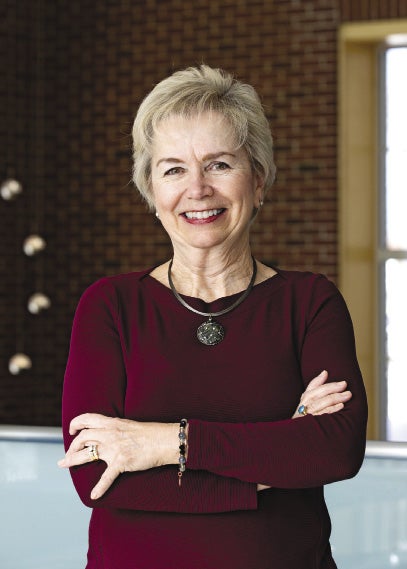Susan West Engelkemeyer might be an unlikely prominent face for higher education in Central Massachusetts, at least when it comes to her original college.

Engelkemeyer chose her college, a small women’s school in Missouri, because it offered a major she was interested in: equestrian studies. Stephens College was one of the few schools nationally with such a program, and that sealed it. Engelkemeyer got her degree, but quickly found she wouldn’t be launching a career working with horses. Instead, she took after her father – a serial entrepreneur, she said – and started her own business.
For seven years, Engelkemeyer owned and ran a gift shop offering handcrafted items before selling it and figuring she should get her MBA. She thought about starting another business, but while writing up a business plan, she took up a suggestion to teach while she was earning her degree at East Carolina University in North Carolina.
“I thought, ‘Wow, this is where I want to be,’” said Engelkemeyer, the president for nearly the past decade of Nichols College in Dudley.
A career that went from horses to entrepreneurship took a turn again toward higher education, and Engelkemeyer has been there ever since.
Engelkemeyer, who grew up in Pennsylvania, Ohio and Indiana, then earned her doctorate in education from Clemson University in South Carolina. She first came to Massachusetts when she joined the faculty at Babson College in Wellesley. Professors there were expected to be experiential, she said, so her first-hand knowledge of running a small business came in handy.
From Babson, Engelkemeyer became the business dean at Ithaca College in New York and then UMass Dartmouth. In 2011, she became Nichols’ president. It’s a perch she never expected to reach.
“I always wanted to be a dean,” Engelkemeyer said, “but I didn’t think much beyond that.”
In fact, she hadn’t heard of Nichols until very shortly before the college reached out to her to see if she had any interest in its open presidency. Someone at UMass Dartmouth suggested Nichols’ professional development program for students as a model for what UMass could do, and Nichols happened to contact her weeks later.
For Nichols, Engelkemeyer was a steady presence at the helm for nearly a decade during what has been a challenging period for many small colleges, with rising student costs and shifting demographics – and that was before international student enrollment dropped and the coronavirus pandemic.
Under Engelkemeyer, Nichols grew enrollment by 20%, retention by 30% and its graduation rate by 50%. Its endowment grew by $17 million.
Nichols saw its enrollment reach an all-time high at 1,218 just before the pandemic hit, and a $66-million fundraising campaign, its largest ever, enabled four major construction projects and quadrupled the number of endowed scholarships for students.
“We have a remarkable alumni base,” Engelkemeyer said of the former students who made up a bulk of the fundraising campaign’s donors.
Engelkemeyer’s leadership is valued on the Higher Education Consortium of Central Massachusetts, whose executive committee she served on for three years. The Worcester-based consortium, which enables the area’s colleges to work collaboratively, benefitted from Engelkemeyer’s presence, said Jeanine Went, its executive director.
“Behind her soft-spoken persona is an incredibly intelligent and business-savvy woman,” Went said. “She demonstrated a strong drive to help Nichols College succeed. She was focused on their mission throughout her tenure. The Greater Worcester higher education community will miss her collegiality.”
Engelkemeyer announced her retirement last September, as Nichols was getting underway on its second semester of operating during the pandemic. Nichols was largely spared by the virus, electing to hold classes and host students on campus this fall, spending $1 million over the semester testing students, faculty and staff. Nichols conducted more than 25,000 tests for the fall semseter and had 28 come back positive – a phenomenally low rate of 0.1%.
Other needs took a back seat, but not for long. In January, Nichols announced three new academic degree programs to start next year: sport sales and strategy, sport marketing and content creation, and real estate management.
Nichols has long known the challenges it faces as a small school in a region with fewer high school graduates in the years ahead. Atlantic Union College in Lancaster closed in 2018 and Becker College in Worcester is working to avoid its own potential closure after this academic year. In Nichols’ case, it is working to play up its strengths, particularly in management. Four out of five graduates earn a business degree.
“We tried to be mindful of what’s out there that we have to be aware of, and keep polishing that stone,” Engelkemeyer said of paying attention to where the workforce demands the most graduates. “We’re not trying to be all things to all people, that’s for sure.”
Engelkemeyer maintains confidence in Nichols’ years ahead.
“Nichols has been here since 1815, so I think it’ll be here for another 200 years or so,” she said. “It’s always been a scrappy institution that’s adapted and thrived.”

